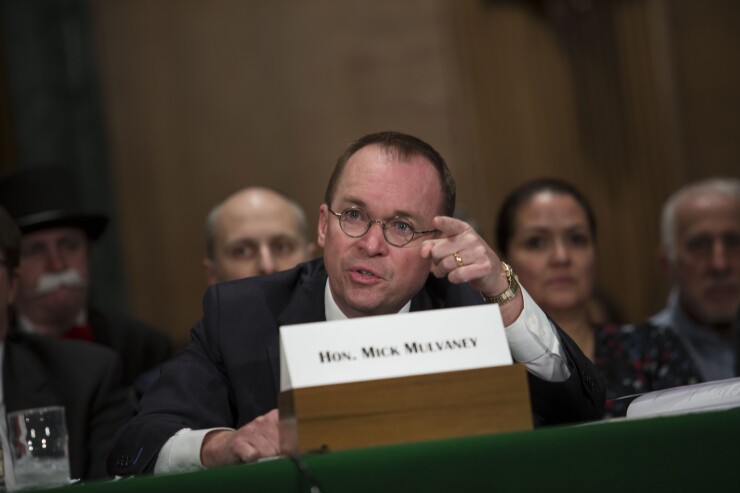The Consumer Financial Protection Bureau would face daunting legal risk if it delayed its own payday lending rule. But that is a risk the bureau may be willing to take.
The agency's options for unwinding the rule narrowed considerably this week after a judge for a second time denied a request to stay the rule's 2019 effective date.
The CFPB would prefer such a stay to avoid legal challenges, allowing time to rewrite the 2017 regulation without forcing lenders to have to prepare for two competing rules. The industry, meanwhile, would likely prefer that the rule be rescinded,

The latter option is legally risky with the binding nature of the 2017 rule under the Administrative Procedure Act. But with the CFPB unable to delay the compliance date through the courts, the bureau is expected to try to on its own — through a limited rulemaking — even if consumer advocates may challenge that move legally.
"There's a significant likelihood that the bureau will be taking action to stay the effective date of the rule," said Quyen Truong, a partner at Stroock & Stroock & Lavan and a former assistant CFPB director and deputy general counsel.
Acting CFPB Director Mick Mulvaney suffered another blow this week when U.S. District Court Judge Lee Yeakel again refused to stay the compliance deadline. Yeakel declined a motion to reconsider his ruling from April, which turned down the
In the motion asking the court to reconsider the compliance date, the CFPB said that it "reasonably expects" that it "will not be possible" to complete a new rulemaking before August 2019.
The CFPB said that lenders "will have had to incur considerable costs to prepare to comply with a rule that may be fundamentally altered through rulemaking."
Payday lenders now are calling on the CFPB to immediately extend the compliance date. Lenders said there is too much uncertainty around having to technically comply with a rule set to go into effect next year that Mulvaney has signaled will change dramatically.
"It's fair to say there's a good amount of uncertainty and that's not good for business," said Ed D’Alessio, executive director of the Financial Service Centers of America. "We would like to see this uncertainty resolved by a rulemaking to extend the compliance date."
The CFPB has the authority to rescind, modify or replace the payday rule, which was finalized in October 2017 after three years of research and deliberation. The payday rule was issued under former CFPB Director Richard Cordray. (The bureau did not respond to repeated requests for comment for this story.)
The payday lending rule technically went into effect in January but payday lenders have until August 2019 to comply.
The rule does not directly affect banks and credit unions since it was tailored to regulate only short-term loans of up to 45 days.
Since taking the helm of the bureau, Mulvaney has made clear his intent to reopen Cordray's rulemaking and revise the payday lending regulations more to the industry's liking.
Mulvaney said in January that the CFPB would "reconsider" the payday rule that puts many restrictions on lenders, even as the Office of the Comptroller of the Currency and the Treasury Department are encouraging banks to dive into short-term lending as well.
In addition, the National Credit Union Administration currently is seeking comments on a proposal to create a second product that credit unions could offer in addition to its Payday Alternative Loans program, known as PAL, created in 2010. The NCUA's proposal would set a maximum loan at about $2,000 and a maximum term of 12 months, and restrict the number of loans in a six-month period.
The CFPB has said it expects to release a new notice of proposed rulemaking by February 2019. But with the agency legally obligated to hold the proposal open for comment before finalizing changes, the process would likely run up against the compliance deadline for the original rule. Any effort to change the payday rule would require a public comment period of at least 60 days.
D'Alessio said that while the CFPB has the legal authority to rework the rule, rushing the process could put the agency in violation of the APA.
"There is a good amount of work that has to go into reworking the rule, and both the factual and legal underpinnings," he said.
Meanwhile, Treasury said
"I don't think the Treasury report is intended to provide additional legal grounds, but it provides political support for reconsideration and potential repeal," Truong said.
But the CFPB cannot simply repeal the payday rule by citing policy differences with the former director. It also is unclear if the CFPB can halt the rule's effective date while also seeking to rewrite the regulation, lawyers said.
Lawyers point to a ruling last year by the U.S. Court of Appeals for the D.C. Circuit that dealt a blow to the Trump administration's deregulatory agenda by
"The bureau could theoretically issue a rule saying there’s no need for a federal rule because the states are covering it well enough, or it could propose a rule that does some things, but says it will revisit further steps if necessary, or something else," said Jane Luxton, a member of the law firm Clark Hill. "The bureau could be sued either way, and will have to defend its decision from an APA attack as arbitrary and capricious."





